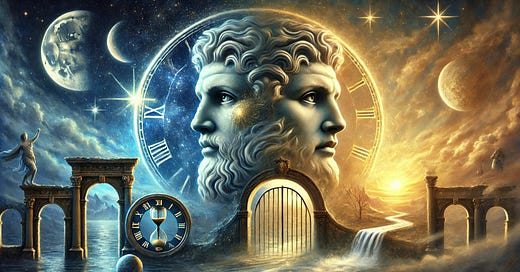Dear Friends
The turning of the year is a moment when time seems to pause, and we stand at the gates of what has been and what is yet to come. The old year recedes like the tide, leaving the shoreline scattered with the flotsam of memory, while the new year rises like the first blush of dawn, full of mystery and untapped potential.
It is a time when we feel both the heft of the past and the haul of the future, as if Janus himself, the two-faced god of thresholds and transitions, is inviting us to look both back and forth. To stand with Janus is to embrace a liminal space, to inhabit the doorway between past and future, known and unknown, self and other.
We might call it a time of dwelling in the hinges.
I have written extensively about the presence of Janus in my own life—it is deeply bio-mythic, his twin gaze embodying the paradoxes of existence. Now, as one year fades into the next, it stirs contemplation of our own duality, reminding us that we are always in transition, forever moving between states of being. The invocation of Janus is an acknowledgement that every ending births a new beginning, just as in each farewell lies the seed of greeting.
This is the threshold moment that calls the poet to the page and the traveller to the unknown. It is a moment deeply entwined with Jung’s guiding question:
“What myth am I living?”
To ask this question is to awaken to the possibility that our lives are not accidental—that the cosmic threads of a far greater story are already sewn into the fabric of our being. It is the hidden song that echoes through the everyday, an ancient melody weaving its way through our most profound joys and sorrows.
As we find ourselves in the doorway between years, the question invites us to consider the whispered command in Rilke’s Archaic Torso of Apollo:
“You must change your life.”
This is the challenge posed by the myth we are living—to transform, to grow and to align ourselves more deeply with the archetypal threads that shape our journey. What better time than now, when Janus is inviting us to honour the path we have trodden while daring to imagine where it might lead?
Rilke urged us to “live the questions now.” In Letters to a Young Poet, he wrote:
“Be patient toward all that is unsolved in your heart and try to love the questions themselves... Live the questions now. Perhaps you will then gradually, without noticing it, live along some distant day into the answer.”
As the calendar flips, this becomes the grand invitation. Rather than striving for ‘resolutions’ that tether us to fixed outcomes, we might instead grasp the opportunity to ask big and beautiful questions of ourselves—and of the world—and then boldly live them, embracing all the uncertainties and infinite possibilities they possess.
To engage with Jung’s question is an act of tremendous courage. It requires peering into the depths of one’s self, risking the revelation that the life we thought we were living is but a fragment of a much older and larger story.
In shaping your life as an answer to such an inquiry, what is slowly revealed is not just your own story, but threads of the vast mystery that binds us all.
As I stand under the watchful eyes of Janus, I hear the words of Mary Oliver:
“Tell me, what is it you plan to do with your one wild and precious life?”
Oceans of love.
Asher
References:
Jung, C.G. (1961). Memories, Dreams, Reflections. Edited by Aniela Jaffé. Translated by Richard and Clara Winston. New York: Pantheon Books.
Rilke, R.M. (1993). The Selected Poetry of Rainer Maria Rilke. Edited and translated by Stephen Mitchell. New York: Vintage International.
Rilke, R.M. (1986). Letters to a Young Poet. Translated by Stephen Mitchell. New York: Vintage Books.
Oliver, M. (1992). New and Selected Poems. Boston: Beacon Press.
Notes:
There are still a couple of places left to join me for The Way. Beginning January 20, this year-long container is designed for men to descend into soul. Please reach out if you’d like to know more.
If you enjoyed this post, please consider joining our mythopoetic community at The Fifth Direction. Through breath, meditation, poetry, storytelling and ritual, we reclaim our mythic imagination and celebrate the return to soul.
The Fifth Direction is a welcome community for everyone. This includes people of all genders, faiths, backgrounds, orientations, ages and abilities.
This project is entirely supported by you, the reader and the listener. If joining the community isn’t your path, perhaps you could consider a small contribution.




